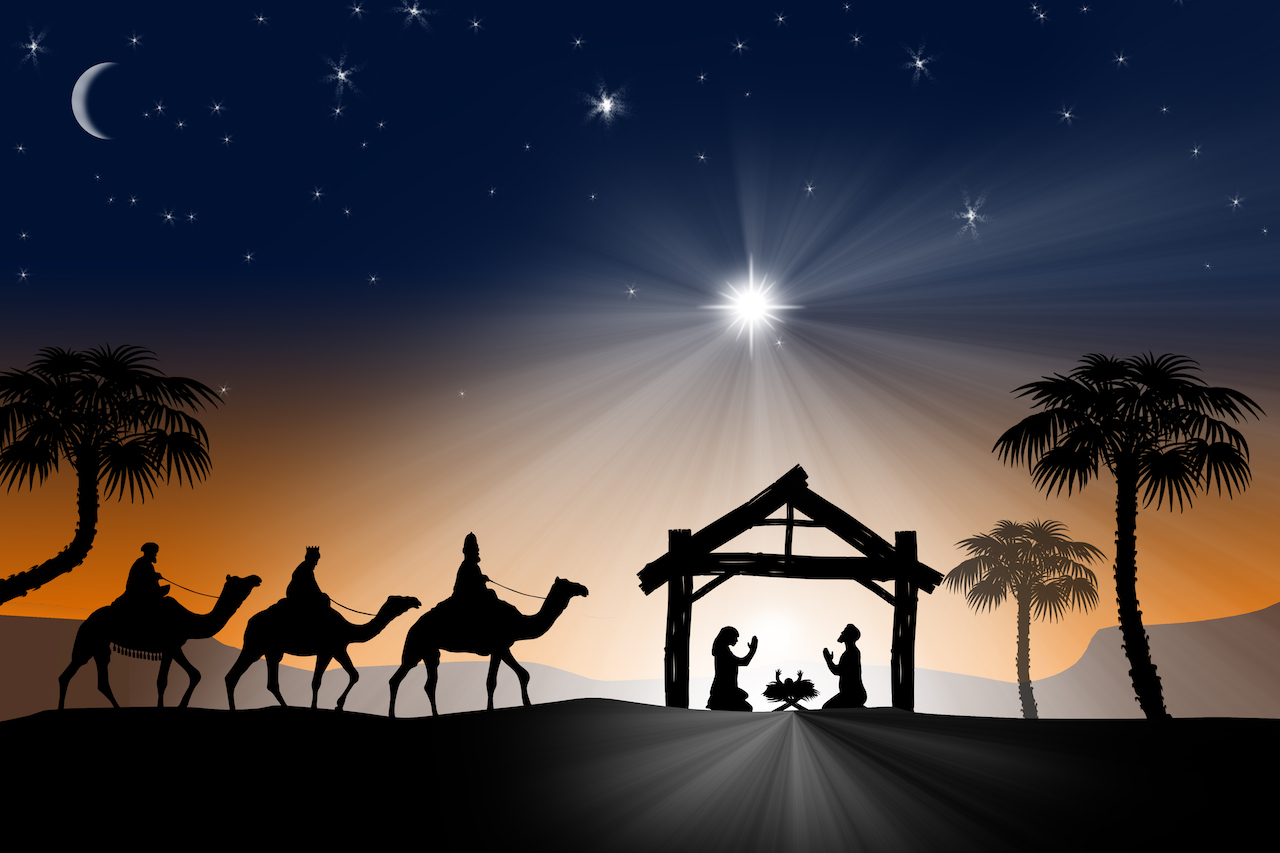
The tired cliche says, “The enemy of my enemy is my friend.” Or to paraphrase Shakespeare, “disgust makes for strange bedfellows”. There is an informal, unintended, and unacknowledged collaboration between those who we might characterize, without any offense intended, as “ultra-fundamental Christians” and those that are self-professed pagans: They both desire to see Christmas “die the death.” These Chistians are the ideological heirs of the Saxxon reformers and Puritans who revolted, both physiologically as well as politically, against the pagan connections they perceived in common Christianity. (We will refer to these Christians, both historic and contemporary, as small-p puritans.) Chief among the pagan connections they decry is Christmas. The pagans also object to Christmas, but for the opposite reason. Humorously, where the puritans see too much Pagan in Christmans, the pagans see too much Christ in Christmas; but they strangely converge on the desire to cancel Christmas if possible, or to banish Christ from it if cancelling proves impossible. But despite the puritans’ accusations against Christmas, there is strong evidence and compelling arguments for the piety of Christmas.
Christmas is full of Gospel imagery. Not just Biblical symbolism, but more importantly Gospel truth. For every supposed pagan element that can be pointed out, a Gospel witness can be summoned; and often that Gospel witness is the same alleged pagan element. For example, the Christmas tree is a favorite target of the puritan inquisition to expose the pagan roots of the holyday; however, even though trees do figure prominently in some pagan traditions, they figure even more prominently in the Gospel. Trees might be important to pagan rituals, but they are absolutely essential to the Gospel narrative. It is true that the Bible records, and condemns, ungodly devotion that took place in groves, and the pious leveling of those tree lined centers of wickedness; but it is equally true that the Biblical authors also referenced trees as symbolic of strength, life, and virtue. The puritan argument points out that the Christmas tree is an evergreen because it is a pagan symbol of life. But trees are a Biblical symbol of life. In fact, God planted in Eden and in New Jerusalem the actual Tree of Life. Faith is depicted as growing into a great tree. And the pine tree of Lebanon is promised to beautify the sanctuary of God in the Kingdom of His Messiah. And the Gospel glories in the tree.
The puritans are quick to point out the striking similarities between the Christmas tree and the idolatrous handiwork denounced by Jeremiah in the tenth chapter.
“One cuts a tree out of the forest, the work of the hands of the workman, with the axe. They deck it with sliver and gold; they fasten it with nails and with hammers, that it move not. They are upright as the palm tree, but speak not; they must needs be born because they cannot go.”
But this description easily applies to a host of craftsmanship associated with religious worship. Crosses, steeples, church buildings, pews, pulpits, signage. Technically anything made of wood and used in liturgy is subject to the same reprobation. Even Bibles themselves that are made of wood pulp and gilded with silver and gold on the page edges and title embossing. After all, the only dendrological description of the type of tree that they might have used is “palm tree”, not the “evergreen tree”. However, that is simply responding with the same incidental convenience as the objection musters. The sin Jeremiah is condemning is not the use of trees as religious decorations or symbols, nor the adorning of religious artifacts. God designed and commissioned a slew of religious artifacts, decked with copious amounts of silver and gold, many of which were fabricated from wood hewn in the forest, and fastened with nails and hammers. The sin that Jeremiah is reproving is the sin of idolatry. If a person is worshiping a Christmas tree, that is sin. As is worshipping a pulpit, or a steeple, or a cross, or bass boat. But a Christmas tree is no more an inherent object of worship than a photograph of a dead relative is a graven image. And, to get more to the point, a person erecting a Christmas tree to symbolize and commemorate the birth of Jesus is no more in violation of Jeremiah 10 than a person who has answered the “revival call” and walks the aisle to kneel in front of a wooden chair and pray. Couldn’t the first celebrate the birth of the Savior without a tree and even without Christmas? No doubt. But couldn’t the penitent repent without an altar and without an aisle and without a chair and without a heart-rending hymn?
We must also consider the decorations on the tree. The puritan indictment is that the orbs, spheres, and stars represent the heavenly bodies that the pagans both worshiped and feared, and that these have nothing to do with Christianity. But that is not true. The celestial host was created by God for us. They serve as windows whereby we glimpse into the eternal power and Godhead. Upon them God paints the signs of our future history. The sin of the pagans isn’t observing the stars and planets, nor representing them in art and even spiritual decoration. It is the fear and idolatry they render to them that is sin. For a Christian the sun, moon, stars, and planets are nothing more than God’s jewelry — his ornaments — and they decorate the evergreen tree, an apt symbol of the eternal Son of God, with symbolic representations of that heavenly adornment.
As is always the case, it isn’t the object that is good or wicked; pagan or Christian. There is no such thing as a pagan tree anymore than there is a Christian tree. There is no holy tree nor unholy tree. Insofar as the actual organic material is concerned, everything God made is good. Paganess can only describe what happens under a tree. The tree is as immaterial to the characterization of that activity as the dirt upon which it takes place and the sky beneath which it is performed. If there are pagan trees, there must also be pagan mountains, pagan clouds, pagan air, pagan water, pagan grass, and pagan fire. And if we banish every natural element that has been used in the service of pagan activities or that was present at those activities then must we needs go out of the world. But here the real issue is which came first, the chicken or the God? Long before pagans reimagined the use of these natural elements, God declared them good and under the dominion of man for the glory of God, and that was very good. Pagans have absolutely no power to emancipate God’s creation from the grip of His blessing.
Another accusation raised by the puritans is the practically indisputable fact that Jesus was not born on December 25th, but rather that Chrisitians pegged his birth on that date to co-opt the already existing pagan celebrations of Sol Invictus and Saturnalia. But this is not a doctrinal or moral indictment. It is a tactical disagreement. The puritans would prefer no overlap whatsoever between Christianity and all other belief systems. They seem to require that their faith be cut from entirely new cloth never before woven. The sincere believers who piously celebrate the birth of the Christ, believe that they are called to make the world Christ’s. We are not only free to eat things sacrificed to idols, but to do so giving thanks to the Lord and so co-opting pagan ignorance to the glory of the Gospel. However, this puritan indictment also overlooks the historical record that the church has been consistent since at least the times of Tertullian (3rd century) to reprimand those that would introduce pagan elements into the Christmas worship. Christians today have no more interest in incorporating pagan liturgy into Christmas worship, than puritans have in scabbing over pagan harvest festivals into the Thanksgiving celebration.
Here it is important that we distinguish between deliberate paganization of Chrisitan tradition and typical human uncreativity. Are there sights and sounds in Christmas that are reminiscent of overlapping pagan holidays? Of course there are. But what does an American Christian gathering on the Fourth of July look like and sound like? A little bit like Nationalism? A little bit like Americanism? Perhaps the singing of the Battle Hymn of the Republic? A sermon on freedom? A prayer thanking God for being born in the greatest nation on earth? Maybe people dressed in Red, White, and Blue? Perhaps an American flag hanging in the sanctuary? Are these not sight and sounds injected into the faith, which are alien to it? There is no circumnavigating this reality. Our liturgies reflect our culture. This is the import of Paul’s admonition that if you are called being circumcised, do not become uncircumcised, and visa-versa.
It is true that complete abstinence is one way to testify to the world that we no longer run with them in the same excess of riot. But it is not the only way. We can also testify the same to them by regarding the day unto the Lord. Sanctifying it, claiming it as rightfully His because he made it. The day is the Lord’s and everything in it. Which of these approaches is more effective? That is the question. Not which is right and which is wrong. Because otherwise how far are we going to take this? Do we abstain from the Lord’s supper if it coincides with any of the pagan holidays involving death and commemorative meals? Do we abstain from Thanksgiving because it coincides in date and practice to the heathen Autumn rituals of harvest worship? Why is Christmas singled out so especially?
One of the more dissonant puritan objections to Christmas is the ever increasingly secular nature of it. This is truly the proverbial trap where you are damned if you do and damned if you don’t. On the one hand Christmas is bad because it is religious with pagan roots and overtones; but on the other hand it is bad because it is secular and godless. It would seem that the more secular it becomes the less vitriol the puritans should invect. After all, most of them don’t seem to have an issue with birthday parties, or National holidays, or weekends — all of which are, at best, secular. But the dissonance is that the secular nature of modern Christmas, especially in the anglo-saxon world is a direct consequence of the Puritan campaign against Christmas. Under Cromwell’s Commonwealth rule, the Puritans legislatively and forcefully drove Christ out of Christmas, until all that was left were the habits of the celebration. Even when the monarchy was restored, private Christmas celebration never really recovered Christ. In the place of Christmas hymns praising the birth of the Savior were holiday songs in praise of food, drink, snow, fire, and reindeer. Ironically, the Christ-centered Christmas that the Puritans despised because of its supposed pagan roots, became the very essence of Paganess: Celebrating food, drink, consumption, and mythological animals. The Puritan goal was to drive Christmas out of religion, but all they really accomplished was to drive religion out of Christmas. In the end there was no less Christmas in their lives, but there was almost no Christ in their Christmas, and consequently less Christ in their lives.
In the same vein is the opprobrium that so many Christians only celebrate Christmas out of selfishness and covetousness. That is true. So new rule: Any Christian event where anyone participating is found to be less than perfectly sincere and devout is henceforth canceled and condemned, both now and evermore.
One last puritan argument against Christmas should be considered: Nowhere does the Bible command us to celebrate the birth of Christ, much less on December 25th. This is a weak argument from the start. Christians perform many services to God that he never commanded them to do, and in ways he never commanded them, and at times he never commanded them. So where do they get the detailed instructions they follow? From their cultural heritage. Germans worship like Germans, Mexicans like Mexicans, Americans like Americans, and Texans like God intended. Does God command us to have musical instruments in church services? Or to sing out loud for that matter? (The command is to sing and make melody in our hearts, for crying out loud.. and that is commanded by the way.) We are not commanded to have a “preaching hour” or a “Sunday School” or a pulpit or an altar call or a church building or to drive to church or a plethora of other cultural debris that has filtered into our personal instantiation of Christianity.
But beyond the logical weakness of the argument, it is fundamentally untrue as well. To even suggest that Christians are not commanded to celebrate Christ totally, completely, and in every detail borders on heresy. Let’s get this straight: We are supposed to celebrate our child’s birthday, our wife’s anniversary, our country’s independence day but not the Blessed Savior’s incarnation? Angels rejoiced Hosanna in the heavens, but we drown in fastidious pedantry over what is commanded and what is not. God forbid we kiss the Son too much! On this point the puritans seem to be cut from the same bureaucratic cloth as the Jews that stood in the way of the Samaritans: Not on this hill can you worship God! Not on this day! Not in this temple! Well, truly they are the people and wisdom will die with them.
Aside from responding to the puritan invectives, there is a positive case to be made for Christmas. It is a celebration of Christ that has engulfed the entire world. No other religion or non-religion has such reach. This is not something to denounce. We should no more hate Christmas than we should hate that the world’s calendar is fixed to the birth of Christ. How is that a bad thing? Don’t we want Christ to be magnified? Of course we do. The entire world depends on the celebration of the birth of Christ, whether they like it or not, whether they admit it or not. Take away Christmas, and the world economy crumbles around us.
It is easy to decry the consumerism and quid pro quo that is rampant in Christmas, but that is an over-simplification. At no other time in the year are Christians more giving and generous beyond the circle of their own friends and family than at this time. They give more to the poor, to missions, to strangers than at any other time. And not just on one day. The constant and ubiquitous bombardment of Christmas carols grease the charitable wheels of the Christ-like heart; as well as the hearts of the not so Christ-like. Just because many are self-serving at this time and only give to get is not a reason to cancel Christmas. Paul didn’t cancel the Lord’s supper just because many Corinthians were gluttonous, drunken, and self-serving. He admonished them to repent and partake worthily.
Chrisitans should be happy that Christ is high above the heavens, and not just for one day, but practically the entire month… and would to God it would be year round! Christmas is an unparalleled opportunity to inject more of Christ into the world; we shouldn’t let that huge opportunity slip through our fingers just because we are desperately trying to strain out the faintest traces of paganism from the church. People are more open to going to church, to hearing the gospel, to talking about the Lord Jesus during Christmas than at any other time in the year. This isn’t something to condemn. Undoubtedly there is a lack of Christ in the lives of the common man. But stripping them of Christmas is counterproductive to remedying that lack. We should take the approach of Jesus when reconvening the Pharisees for their OCD on tithing but ADHD on judgment, mercy, and faith: He encouraged them to continue doing the first and to aspire to also do the second. Let us add Christ to their July and August not subtract Him from their December. And if the common man has only a tiny sliver of Christ in their Christmas, let us fan that small flame. It is assuredly the time and place they are most amenable to increasing the presence of Christ and surrendering to Him. If there were no other Christmas virtue, this alone would be sufficient. Christmas itself is a Christmas miracle.
Afterward
For those unaware of what a Steel Man, or Iron Man, argument is: It is an attempt to make the very best argument possible for a position you don’t agree with. If possible, even a better argument than the one those who hold the position can make for themselves. It is the opposite of a Straw Man argument, which consists of assembling the worst possible argument, full of semi-hidden flaws intentionally mixed in for the purpose of then easily tearing the straw man argument down. Steel man arguments are very difficult to make, but they are very profitable. In this essay, I attempted to build a steel man argument. You be the judge if it is a solidly built, honest, rigorous steel man argument or if it is just another straw man.
M. N. Jackson is a founding elder and teaching pastor of Free Born Church. He was a missionary in Mexico for over 20 years where he was part of a team of church planters. After being deported from Mexico for preaching the gospel, he returned to San Antonio, and continued ministering the word.


